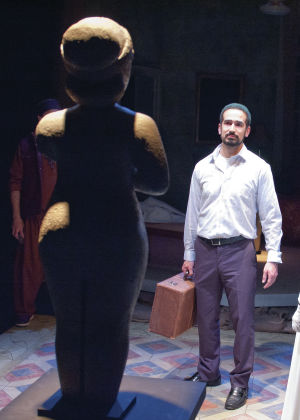
Technically, the McGuffin driving our plot is a graven idol, but this is no Maltese falcon, coveted by its pursuers solely for its material value. Instead, Michele Lowe's Inana opens in 2003, in a London hotel room where Mosul museum curator Yasin Shalid and his new spouse have arrived for their honeymoon.
Our first clue that something is amiss is the husband recounting to his bride (who has barricaded herself into the bathroom), how his boyhood chum had his fingers amputated as punishment for gathering the shards of artifacts ubiquitous to ancient civilizations.
The significance of the mysterious suitcase mingled with the couple's luggage, and the secret behind his wife's reluctance to remove her wedding dress, are also forthcoming, but only after we have learned that the statue precipitating international intrigue is a 3,000-year-old stone representation of Iraq's Mesopotamian mother goddess Inana, the twin of another effigy destroyed centuries earlier by Mongol invaders. Faced with thuggish religious zealots determined to eradicate purveyors of "decadent' art, as well as the imminent threat of war between the United States and Saddam Hussein, Shalid has vowed to protect his country's precious icon from the hostile factions and rapacious looters associated with foreign occupation.
So is this a political drama designed to elicit horror at the atrocities of Middle Eastern dictators—a bookseller whose fingernails are ripped out by vigilantes offended at his displaying a nude Botticelli cherub in his store window, for example? Is it a romance of lovers on the lam, and a father's desperate scheme to secure the safety of his daughter? Or is it a heist thriller of smuggled treasure, meant to keep us guessing the extent of each character's involvement in the subterfuge?
In a mere ninety minutes, Lowe combines elements of all three genres to present playgoers with their choice of narrative entryways onto paths all ultimately leading to wonder and admiration at the sacrifices undertaken by humble citizens to ascertain the perpetuity of their culture.
These multiple dimensions—did I mention the flashbacks and the double-casting?—could easily descend into vertigo-inducing chaos, but director Kimberly Senior ensures that all transitions are executed cleanly and crisply. She is assisted by the precision reflected in the environmental design, and by an ensemble delivering unexaggerated, immediately sympathetic, portrayals of lone individuals caught up in extraordinary circumstances demanding courage, however microcosmic the range of its expression.
